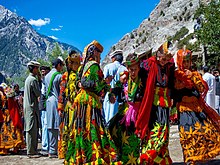Orang Kalash
Kalasha (Kalasha: Kaĺaśa, Nuristan: Kasivo, bahasa Urdu: کالاش) atau Kalash, adalah penduduk asli Dardik yang bermukim di Distrik Chitral di Provinsi Khyber-Pakhtunkhwa, Pakistan. Mereka menuturkan bahasa Kalash dari rumpun bahasa Dardik yang merupakan cabang rumpun bahasa Indo-Arya. Mereka dianggap sebagai kelompok yang unik bila dibandingkan dengan orang-orang Pakistan lainnya.[8] Mereka juga dianggap sebagai komunitas etnoreligius paling kecil di Pakistan.[9] Suku ini menganut agama yang telah dikategorikan sebagai animisme[1][2][3] atau "sejenis Hinduisme Kuno".[4][6]
 Perempuan Kalash | |
| Daerah dengan populasi signifikan | |
|---|---|
| Distrik Chitral, Pakistan | |
| Bahasa | |
| Kalasha, Khowar, Urdu | |
| Agama | |
| Animisme[1][2][3] / Hinduisme Kuno,[4][5][6] Islam[7] | |
| Kelompok etnik terkait | |
| Indo-Arya, Nuristan, Iranian |
Suku Nuristan yang terletak bersebelahan dengan suku ini di Nuristan (sebelumnya disebut Kafiristan) pernah menganut agama yang sama dengan suku Kalash.[4][6] Pada akhir abad ke-19, sebagian besar wilayah Nuristan telah diislamkan, walaupun terdapat bukti bahwa beberapa orang masih meneruskan adat istiadat mereka.[6] Seiring berjalannya waktu, perang di wilayah Nuristan mengakibatkan kematian banyak orang Nuristan dan orang-orang Afgan dari sekitar mulai memasuki wilayah ini untuk mengisi kekosongan penduduk.[10][11][12] Di sisi lain, suku Kalash di Chitral tetap dapat menjaga tradisi budaya mereka.[13]

Catatan kaki
sunting- ^ a b Mike Searle (28 March 2013). Colliding Continents: A geological exploration of the Himalaya, Karakoram, and Tibet. OUP Oxford. ISBN 978-0-19-165249-3.
- ^ a b Camerapix (1998). Spectrum Guide to Pakistan. Interlink Books. ISBN 978-1-56656-240-9.
Nowhere is this more evident than among the pagan Kalash, a non-Islamic community living in the isolated valleys of Chitral whose faith is founded on animism.
- ^ a b Sean Sheehan (1 October 1993). Pakistan. Marshall Cavendish. ISBN 978-1-85435-583-6.
The Kalash people are small in number, hardly exceeding 3,000, but they ... and as well as having their own language and costume, they practice animism (the worship of spirits in nature)...
- ^ a b c West, Barbara A. (19 May 2010). Encyclopedia of the Peoples of Asia and Oceania (dalam bahasa English). Infobase Publishing. hlm. 357. ISBN 9781438119137.
The Kalasha are a unique people living in just three valleys near Chitral, Pakistan, the capital of North-West Frontier Province, which borders Afghanistan. Unlike their neighbors in the Hindu Kush Mountains on both the Afghani and Pakistani sides of the border the Kalasha have not converted to Islam. During the mid-20th century a few Kalasha villages in Pakistan were forcibly converted to this dominant religion, but the people fought the conversion and once official pressure was removed the vast majority continued to practice their own religion. Their religion is a form of Hinduism that recognizes many gods and spirits ... given their Indo-Aryan language, ... the religion of the Kalasha is much more closely aligned to the Hinduism of their Indian neighbors that to the religion of Alexander the Great and his armies.
- ^ Bezhan, Frud (19 April 2017). "Pakistan's Forgotten Pagans Get Their Due" (dalam bahasa English). Radio Free Europe/Radio Liberty. Diakses tanggal 11 July 2017.
About half of the Kalash practice a form of ancient Hinduism infused with old pagan and animist beliefs.
- ^ a b c d Minahan, James B. (10 February 2014). Ethnic Groups of North, East, and Central Asia: An Encyclopedia (dalam bahasa English). ABC-CLIO. hlm. 205. ISBN 9781610690188. Diakses tanggal 26 June 2016.
Living in the high mountain valleys, the Nuristani retained their ancient culture and their religion, a form of ancient Hinduism with many customs and rituals developed locally. Certain deities were revered only by one tribe or community, but one deity was universally worshipped by all Nuristani as the Creator, the Hindu god Yama Raja, called imr'o or imra by the Nuristani tribes. Around 700 CE, Arab invaders swept through the region now known as Afghanistan, destroying or forcibly converting the population to their new Islamic religion. Refugees from the invaders fled into the higher valleys to escape the onslaught. In their mountain strongholds, the Nuristani escaped conversion to Islam and retained their ancient religion and culture. The surrounding Muslim peoples used the name Kafir, meaning "unbeliever" or "infidel," to describe the independent Nuristani tribes and called their highland homeland Kafiristan. The Nuristani are sometimes called Kalasha though this name is more appropriate for the closely related Kalash in the neighboring Chitral region of Pakistan. The differences between the Nuristani and the Kalash are religious as the Kalash mostly retain their ancient religious beliefs.
- ^ Pakistan Statistical Year Book. 2012. Pakistan Bureau of Statistics. Karachi: Manager of Publications
- ^ "The Kalash - Protection and Conservation of an Endangered Minority in the Hindukush Mountain Belt of Chitral, Northern Pakistan" (PDF). Diarsipkan dari versi asli (PDF) tanggal 7 July 2007.
- ^ "'Earthquake was Allah's wrath for Kalash community's immoral ways'". The Express Tribune. 2015-11-10. Diakses tanggal 2015-11-11.
- ^ Hauner, M. (1991). The soviet war in afghanistan. United Press of America.
- ^ "Land and property disputes in Eastern Afghanistan" (PDF). iDMC: Internal Displacement Monitoring Centre. Diarsipkan dari versi asli (PDF) tanggal 4 October 2013.
- ^ Noori, Rateb (2013-05-21). "Nuristan A Safe Passage For Taliban To Enter North and North-Eastern Parts of Afghanistan". Tolonews.com. Diakses tanggal 2014-01-04.
- ^ Newby, Eric (2008), A Short Walk in the Hindu Kush, Pan Macmillan, ISBN 1741795281
Pranala luar
sunting- IUCN, the International Union for Conservation of Nature, Kalash Protection and conservation of an endangered Minority in the Hindu Kush
- BBC article on Kalash women
- Muslim Impact on Religion and Culture of the Kalash Zaheer-ud-Din in Al-Adwa 43:30 (2015)
- Kalasha Heritage Diarsipkan 2013-11-09 di Wayback Machine. A website used by the Kalasha people to promote, conserve and protect the Kalasha tangible and intangible heritage
- Investigation of the Greek ancestry of northern Pakistani ethnic groups using Y chromosomal DNA variation